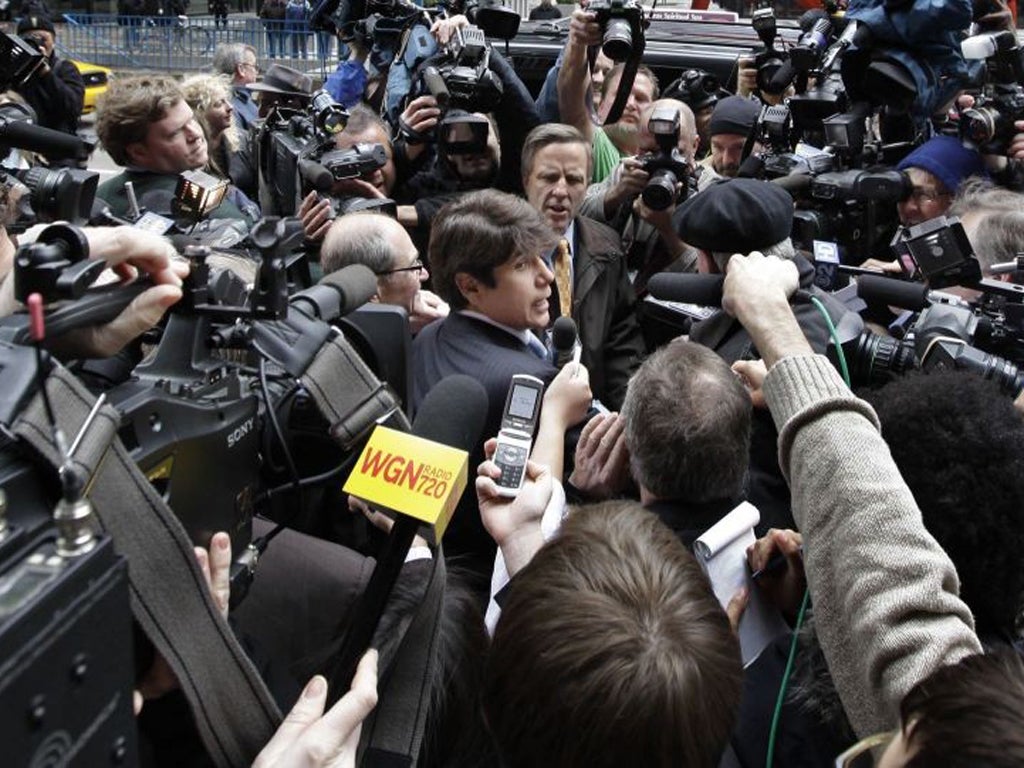Just another Chicago tale of graft and extortion

Your support helps us to tell the story
From reproductive rights to climate change to Big Tech, The Independent is on the ground when the story is developing. Whether it's investigating the financials of Elon Musk's pro-Trump PAC or producing our latest documentary, 'The A Word', which shines a light on the American women fighting for reproductive rights, we know how important it is to parse out the facts from the messaging.
At such a critical moment in US history, we need reporters on the ground. Your donation allows us to keep sending journalists to speak to both sides of the story.
The Independent is trusted by Americans across the entire political spectrum. And unlike many other quality news outlets, we choose not to lock Americans out of our reporting and analysis with paywalls. We believe quality journalism should be available to everyone, paid for by those who can afford it.
Your support makes all the difference.Maybe that devout Catholic, Richard M Daley, had a point, apropos of the corruption for which his home town and state are legendary. "Look at our Lord's disciples," Chicago's former mayor, who attended Mass daily, once declared. "One denied Him, one doubted Him and one betrayed Him. If our Lord couldn't have perfection, how are you going to have it in city government?"
Indeed. The disgrace of Illinois' ex-governor Rod Blagojevich, sentenced this week to 14 years for extortion, bribery, and graft, proves that as far as the civic administration of Illinois and Chicago is concerned, perfection is elusive, to put it mildly. Blagojevich is the fourth governor – and at least the 81st public official – of the state to be convicted on criminal charges in the last 40 years. But just why is Illinois more prone to this sort of thing than neighbours like Iowa, Wisconsin and Missouri?
Whether or not Illinois is the most corrupt of all 50 US states is a matter of dispute. Suffice to say that by one estimate, corruption – in the shape of scandals, bloated payrolls and padded contracts – costs Illinois taxpayers $500 million a year. And this in a state facing a 2012 fiscal shortfall put at $17 billion.
But this culture was not born in Springfield, the sleepy state capital where the Illinois legislature is to be found. These days Springfield is above all a museum, celebrating its most famous son, a 19th-century lawyer and one-time state legislator named Abraham Lincoln. The real seat of the action lies a three- hour drive to the north-east. Indubitably, Chicago is one America's, indeed the world's, great cities, in its magnificent setting on the shore of Lake Michigan. The skyscraper was invented there, it was long the country's mercantile and transport hub, a seat of industry and hard work, the "city of big shoulders" of the poet Carl Sandburg. Chicago may not be the state capital, but it dominates Illinois, accounting for half the latter's population and half of its Congressional seats in Washington. Inevitably, it has set the state's political style.
That style grew from the city's explosive growth, from a swampy village of a few hundred souls in the 1830s into an urban centre of 120,000 by the time Lincoln was elected president in 1860. Those who ran the place, supervising this expansion, wielded huge power. Thus was born an alliance between venal city government and organised crime, and thus emerged the notorious "Outfit" of the early 1900s that would later produce Al Capone. The mayor in Capone's day was "Big Bill" Thompson, derided even then by the local press for making Chicago an international laughing stock, famous for its "unchecked graft".
And all the while there developed the Chicago "machine" – the trading of public jobs, contracts and other services for votes and political support. The "Windy City" may not have invented the practice, but few raised it to a higher art-form than Chicago's mayors, not least the Richard Daleys, father and son, who between them led the city for the best part of half a century.
In Chicago, power has historically been wielded like a club – and often in pursuit of money. "The question has never been how you made it, but if you made it," wrote Mike Royko, the late and legendary Chicago Sun-Times columnist who proposed a new city motto, "Ubi est Mea", or "where's mine?" As Rokyo explained: "This town was built by great men who demanded that drunkards and harlots be arrested, while charging them rent until the cops arrived."
But secretly, one suspects, Chicagoans relish their bad-boy reputation. Outwardly, they may cringe at the fact that, despite Obama, Michael Jordan and Oprah Winfrey, the most famous of their number in the 20th century remains Capone. Yet Blagojevich's misdeeds saw him treated like a wayward rock star.
Blagojevich was sentenced to 14 years in prison, one of the stiffest punishments for political corruption on record. It is intended as an example. But this Illinois scandal is unlikely to be the last.
Join our commenting forum
Join thought-provoking conversations, follow other Independent readers and see their replies
Comments